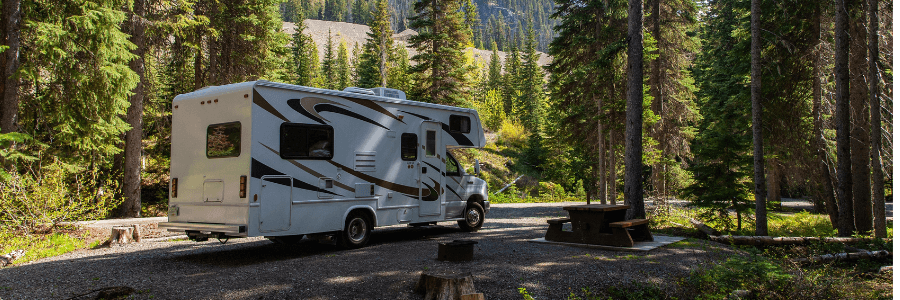Top 10 FAQs for Owning an RV

The thrill of setting out on an adventure at your own pace with a newly acquired motorhome is a feeling that's hard to match. The RV lifestyle is often a dream for many, but understandably, before taking the leap, you might have several questions. That's precisely why, here at South Thompson RV, we've compiled a comprehensive list of frequently asked questions. This resource is designed to assist you in making an informed decision before investing in your own RV!
What Are the Different Types of RVs?
Here at South Thompson RV, we offer a variety of RV types to cater to different styles, sizes, and functionalities to suit your needs:
Motorhome
-
Class A: Large, bus-like units.
-
Class B: Smaller converted vans suitable for 1-2 people.
-
Class C: Mid-sized, accommodating 2-4 people.
Travel Trailer
-
Range from large and luxurious to more modest and lightweight.
-
Typically include amenities like kitchen, toilet, sleeping quarters, heating, cooling, and storage space.
Tent Camper (Pop-up Camper)
-
Compact and lightweight travel trailers with pop-up sections for added sleeping space.
-
Provides a tent-like camping experience.
Truck Camper
-
Fits on the bed of a pickup truck, ideal for 1 to 3 people.
-
No hitching or towing is required, easy to transport.
Toy Hauler
-
Functions as living quarters and provides extra storage space for recreational gear like snowmobiles or dirt bikes.
Fifth Wheel
-
Similar to truck campers but connects to the pickup truck bed using a gooseneck hitch.
-
Spacious and manageable on the road.
What Motorhome Class is Right for Me?
Choosing the right motorhome class depends on your preferences and travel needs. Consider the number of occupants and storage requirements. For a family of 4 with ample storage needs, Class A might be suitable, while solo travellers seeking independence might prefer Class B.
Are Class A Motorhomes Difficult to Drive?
Driving Class A motorhomes is generally manageable. They are not overly complicated to navigate, and modern models often come equipped with surrounding cameras for better visibility. However, longer motorhomes might pose challenges with turns. Practice is essential to master turning without hitting neighbouring cars or misjudging traffic breaks.
Do I Need a Special License to Own or Drive an RV?
License requirements for owning or driving an RV vary by region. For instance, in British Columbia, a regular license allows towing a loaded RV up to 4600 kg, but if the gross vehicle weight exceeds this limit, an upgraded license is necessary. Ontario drivers can tow up to the same weight with a Class A license or require a full G license for a limit of 11,000 kg GVW.
Can You Take Motorhomes Off-Grid?
Taking a motorhome off-grid is more than feasible, especially with modern RVs designed for such adventures equipped with systems that facilitate self-sufficiency.
Can I Tow a Car Behind My RV?
Technically speaking, every vehicle has the ability to be towed behind a motorhome. The only limiting factor is the weight capacity of your RV and the towing method you use. Be sure to check these requirements before you decide to tow a vehicle!
How Much Does It Cost to Store an RV in the Winter?
For unheated indoor storage, rates start around $50 to $125 or more. If you want to have your RV protected from the winter cold, heated RV storage can cost anywhere from $100 to $450 per month. Prices for storing your RV will always be dependent on its size as well as the amenities it carries.
How Much Does It Cost to Maintain an RV?
RV maintenance costs vary depending on regular upkeep and repairs, ranging from a few thousand to $20,000. Significant maintenance expenses often revolve around tire and suspension upgrades. Opting for extended warranties can cover a significant portion of these costs.
How Much Does It Cost to Fill an RV (Class A, B, C)?
Fuel costs for RVs differ by class, with larger motorhomes consuming more gas. For example, a Class A RV may use 18 to 30 litres per 100 km, while a smaller Class C might use 16 to 23 litres. Compact Class B motorhomes tend to be more fuel-efficient, consuming 11 to 13 litres per 100 km.
Can I Test Drive Before I Buy?
Absolutely! In fact, at South Thompson RV, we highly recommend test driving before making a purchase. It's essential for your peace of mind and to ensure the chosen RV meets your expectations. Our dealership supports and encourages test drives to help you make an informed decision!
Whether you’re in the market for a fifth wheel, a travel trailer, or a luxury Class A motorhome, South Thompson RV certainly has you covered! Give us a call or stop by our lot in Kamloops, BC, anytime to check out our inventory of RVs and set up a test drive today!